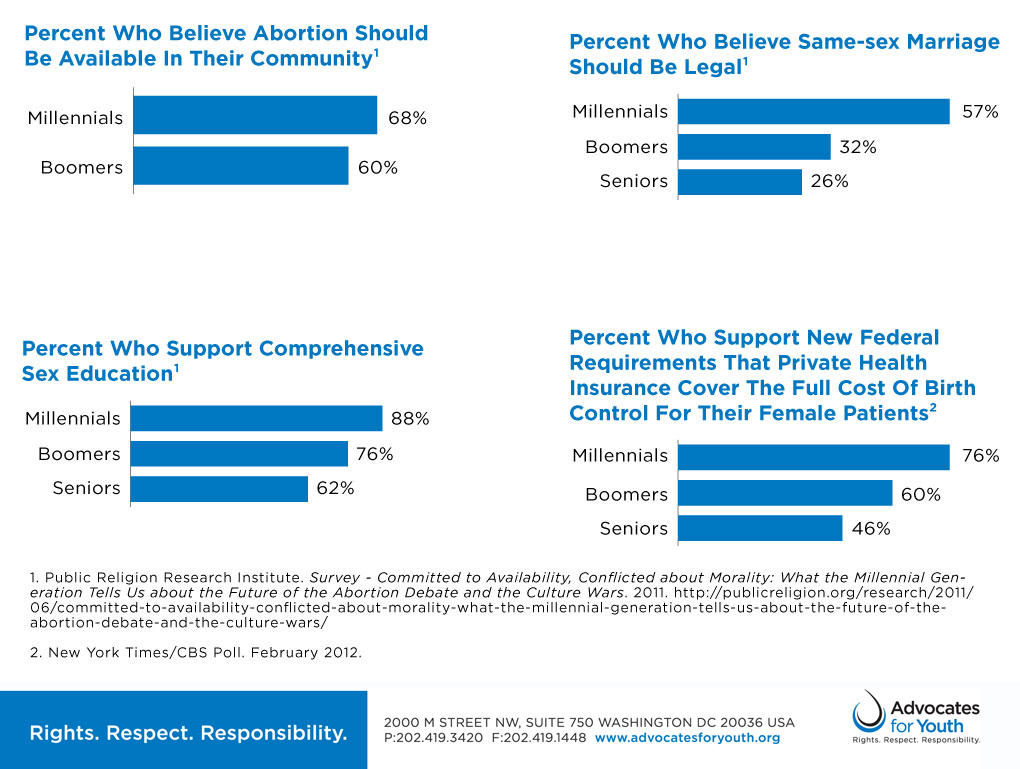ELECTION 2012: The Power of the Youth Vote
Yesterday, any doubt about the power of Millennials was laid to rest. Young people voted at record levels, representing 19 percent of the total voting public – the largest percentage ever, including in the 2008 presidential election.

Yesterday, any doubt about the power of Millennials was laid to rest. Young people voted at record levels, representing 19 percent of the total voting public—the largest percentage ever, including in the 2008 presidential election.
This generation of youth represents one of the most influential, diverse, and socially progressive generations in our history, and they are engaged and taking part in our country’s political debate and as advocates and leaders in the reproductive and sexual health field.
A few facts about Millennials.
Millennials are growing in influence. Globally, almost half the world’s population—more than 3 billion people—under the age of 25. The reproductive and sexual health decisions these young people make will determine the size and health of our planet for decades to come.
Here in the United States, there are approximately 64 million Millennials who were eligible to vote in the 2012 election. This means they represented approximately 29 percent of all eligible voters. Early poll data shows that of those who voted in this election, one in five was between the ages of 18 and 29.
Millennials as a group are expected to grow by four million every year through 2020, when they will number 103 million of voting age. Ninety million Millennials will be eligible to vote in 2020, representing almost 40 percent of all eligible voters.
Millennials are diverse. Currently 39 percent of Millennials are young people of color compared to 30 percent of the general population. Nationwide, communities of color are growing. In fact, between 2000 and 2008, communities of color grew by approximately 20 percent accounting for more than four-fifths of U.S. population growth. Demographers tell us that by 2050 America will become a Minority-Majority nation. Communities of color will make up fifty-four percent of America and Latinos/Hispanics will make up 30 percent of the total population (up from 15 percent).
Much of this change is fueled by youth. In fact, people of color will represent a majority of young people by the year 2023.
And all of this matters to those of us who care about progressive issues, because Millennials are more socially progressive than their older counterparts. Whether the issue is immigration, race and gender equality, religious freedom, environmental and economic justice, or access to reproductive and sexual health services, including abortion, Millennials are more progressive than their older counterparts.

As we continue to get more data, it is likely that young people played an important role in a string of progressive victories: reelecting President Obama; turning the tide in favor of marriage equality with wins in Maryland, Maine, and Minnesota, with Washington poised to join them; defeating an anti-choice ballot measure in Florida; electing the largest cohort of women ever to the Senate, including America’s first openly LGBT Senator; and making history with the passage of the Maryland Dream Act.
Over the next four years, young people will continue to lead us towards new solutions and lasting change. We have a responsibility to work alongside them and we call on President Obama and elected leaders across the country to do the same.
